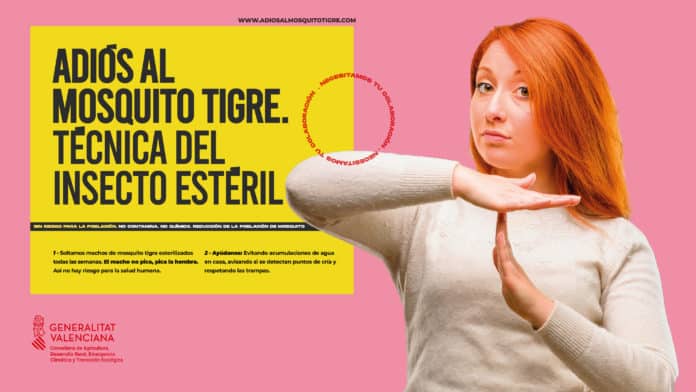The Valencia regional Ministry of Agriculture has begun its annual campaign against the tiger mosquito with the sterilization technique that reduces its populations by up to 80%.
The campaign, called “Adiós al Mosquito Tigre”, started in the municipality of Paterna, with which there is a collaboration agreement for the application of the TIE Method (Sterile Insect Technique), a method in which the Ministry of Agriculture is expert since it has been applying it for more than 15 years against another species, the Mediterranean fly, and now for more than 5 years against the tiger mosquito.
The TIE Method, applied to the tiger mosquito, is a biological control method consisting of the release of millions of sterile male tiger mosquitoes. Although they mate when released, they do not reproduce because they have been previously sterilised. This results in a reduction in the population.
The Ministry of Agriculture breeds, sterilises and releases the male because it is the one that does not bite humans, it’s only the females who feast on our blood. For this reason, the release of thousands of male tiger mosquitoes each week poses no risk to human health.
This information is essential for the population of the municipalities where the Ministry of Agriculture operates after a collaboration agreement and has been one of the main reasons for creating the communication campaign.
The TIE Method is respectful of the environment and the health of people in the fight against pests. It does not contaminate, does not affect beneficial species and does not generate resistance to insecticides. It is therefore a method of biological control, not chemical.
The TIE Method has been applied for more than 60 years against pests around the world. It is a method promoted by the International Atomic Energy Agency, since the sterilisation of the mass-reared tiger mosquito is achieved thanks to its irradiation with gamma rays or X-rays, so that, although they continue to be sexually competitive, they cannot reproduce.
Before Paterna, other pilot experiences have been developed since 2017 in Ribera Baixa (Polinyà de Xúquer and Albalat de la Ribera), with an 80% reduction in the tiger mosquito population, and Plana de Castelló (La Vilavella and Betxí ) with a 60% reduction of the tiger mosquito, populations with which we continue to collaborate also during 2023.
The ‘Goodbye to the Tiger Mosquito’ campaign collects all this information on its website, adiosalmosquitotigre.com, where you can also find out what public actions are carried out at the local level and what citizen practices can be carried out to increase the effectiveness of the TIE Method.
The tiger mosquito is an exotic and invasive species that, in addition to an annoying bite, poses a risk to public health, since it is a vector of up to 22 diseases, including dengue and Zika, and hence the importance of combating it.


